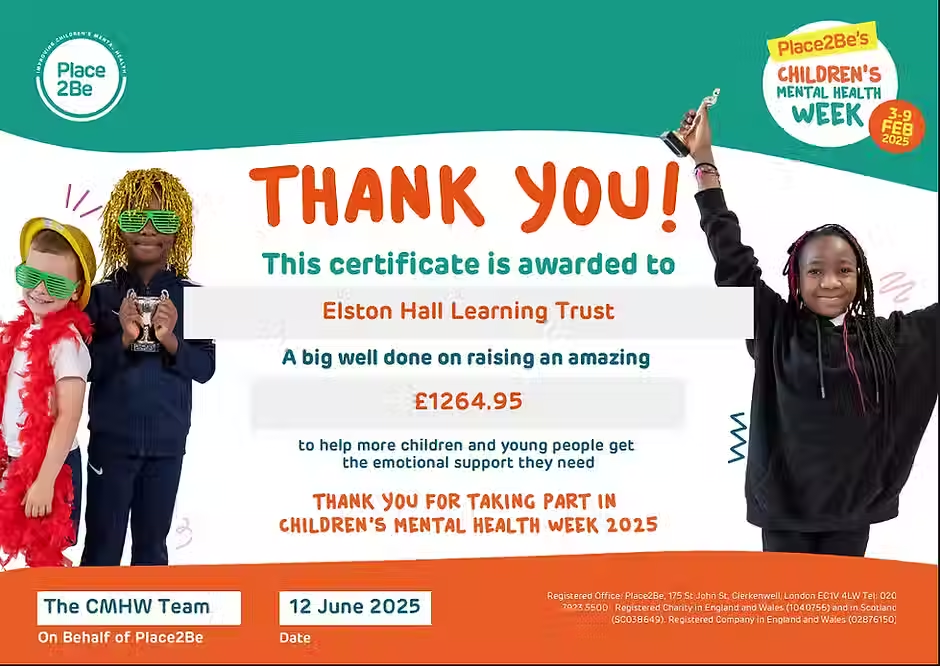
We are currently taking part in the ATTUNE Project.
-
Attachment aware
-
Trauma Informed
-
Trusting relationships
-
Understanding
-
Nurturing
-
Emotional well-being
We are working with the Wolverhampton Educational Psychology Service, who are supporting and developing practice that is guided by an understanding the impact trauma life experience can have on a young person's development, emotions and behaviour. The project aims to help us further develop an environment where all children feel safe and have a sense of belonging and connectedness with the school community.
We all need good mental health and wellbeing – it's essential to living happy and healthy lives, and can help us sleep better, feel better, do the things we want to do and have more positive relationships. It can also help us deal with difficult times in the future.
Good mental health is important for helping our children and young people to develop and thrive. Their emotional health and wellbeing influences their cognitive development and learning as well as their physical, social and their mental health and wellbeing in adulthood.
As a school we have an important role to play in supporting the mental health and wellbeing of our children. We develop approaches tailored to the needs of our children coordinating an evidence-informed approach to mental health and wellbeing within our school which will support and develop a readiness to learn.
It is recognised that our mental health doesn’t always stay the same. It can change as circumstances change as we move through different stages of our life.
Mental health is as important to a child’s safety and well being as their physical health. It is and important issue for children. Over half of all Childline counselling sessions in 2022/2023 related to mental or emotional health and well being. (NSPCC)
Mental Health Spectrum


Supporting Children with Mental Health - Whole School Approach
Elston Hall is a caring community that takes the Mental Health and well-being of its children seriously. We are an inclusive community that has a positive, caring, nurturing and supportive network.
We promote a listening environment, providing opportunities to explore thoughts, feelings and emotions and give opportunities for children to talk within a community that listens and responds effectively.
There is access to a wealth of support, our pastoral support threads through our network of adults across school alongside the Safeguarding and behaviour and Emotional Support team, this is enhanced with our links to further Mental Health and Well-being agencies, In school support can involve 1:1 Bespoke Behaviour and Emotional Support, Nurture groups or family support sessions.
Our early intervention education and support for health education threads through our curriculum to support our children and the wider school community.

I

Mental Health Aware
To support our school community, we access multi-agency support and training to ensure we are equipped to recognise early signs, the best support available and how to access the appropriate support.
For Example:






Mental Health Lead
Behaviour, Emotional
Support
Behaviour, Emotional
Support

Mental Health First Aider for all staff
Behaviour and Emotional Support Team
Collaboration between the Safeguarding, Pastoral and wider agency teams allow us to access and provide the most appropriate support for our young people. Our team are experienced and relevantly trained to provide bespoke support for children and young people throughout our school. This can include bespoke 1:1 sessions, nurture groups or specific therapy sessions such as Drawing and Talking therapy or LEGO based therapeutic coaching.

Drawing and Talking is a child centred one to one intervention focusing on supporting the social and emotional well being of children and young people.
Drawing and Talking is a safe and gentle therapeutic approach, which provides an effective way for children and young people to process emotional pain or trauma they may be experiencing.
Sessions Children can draw anything they choose and will be encouraged to talk about feelings using story telling language to help them make sense of their internal world. Sessions are not a replacement for other specialist services such as CAMHS, Psychotherapy or ART/Play therapy but can be used an interim tool.
For more information:

LEGO based therapeutic coaching was initially developed by Daniel LeGoff (US psychologist) who noticed children with Autism were more engaged in social interaction through the medium of LEGO.
It is a collaborative, play based social development programme for children.
The aim of the sessions are to:
-
promote development in social, communication and play skills.
-
Utilise the child’s strengths to help areas of need in a safe space.
LEGO based therapeutic coaching encourages children to communicate with one another to solve a problem.
Some of the specific benefits children gain include:
-
Increased duration of social interaction with peers.
-
Improved social communication skills.
-
Improvements in maladaptive behaviours (behaviours that prevent people adapting/adjusting in different aspects of life).
-
Problem solving skills.
-
Self-Esteem.
-
Self-Regulation
-
Belongingness.
(LeGoff (2004), LeGoff &Sherman (2006))
Further information to support mental health can found by clicking on the links below.
Signposting to these sites are to provide further information for you to evaluate the best support for yourself or your family member. Signposting to these sites is purely for families to explore further information and is not an endorsement or lack of endorsement of any.
















